Savage AccuCan A22 Suppressor Review
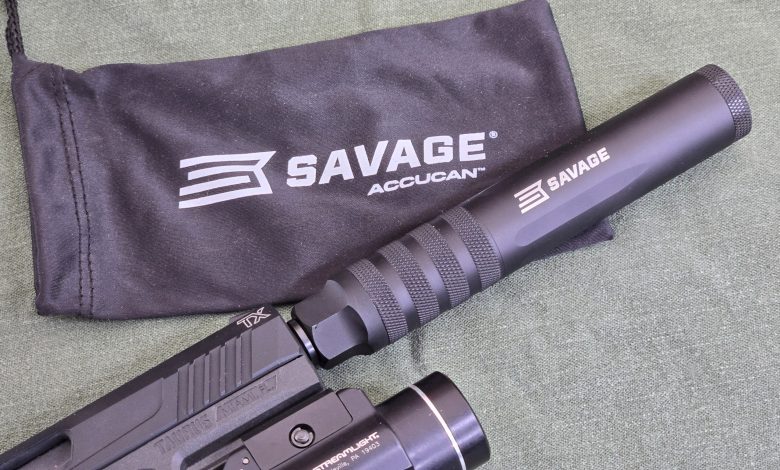
When I got my first rimfire suppressor, I wanted one that was rated for .22 Magnum. I’m a fan of the round, and knew I’d want to use the suppressor on one eventually. Well, due to some lack of research on my part and some sketchy info from a local SOT (Special Occupational Taxpayer or basically, FFL who can legally sell NFA items) who’s no longer in business, I ended up with a .22 LR-only can. It’s a good suppressor, but it didn’t do everything I wanted it to. When I was looking at Savage’s newer .22 Magnum rifles recently, I saw their line of suppressors and decided that if I was getting a Savage rifle I may as well grab a suppressor to go with it. I ended up with the AccuCan A22.
The Savage AccuCan A22
The Savage AccuCan A22 is an aluminum suppressor with a monocore, or as Savage calls it “MonoKore,” design. The suppressor body is made from machined 7075-T6 Aluminum and 6Al-4V Titanium. It has built in self cleaning carbon cutters, and is fully user serviceable using common tools. The external finish is a black hard-coat anodizing. Savage lists the sound reduction at 114 db with subsonic rounds and 135 db with super sonic rounds.
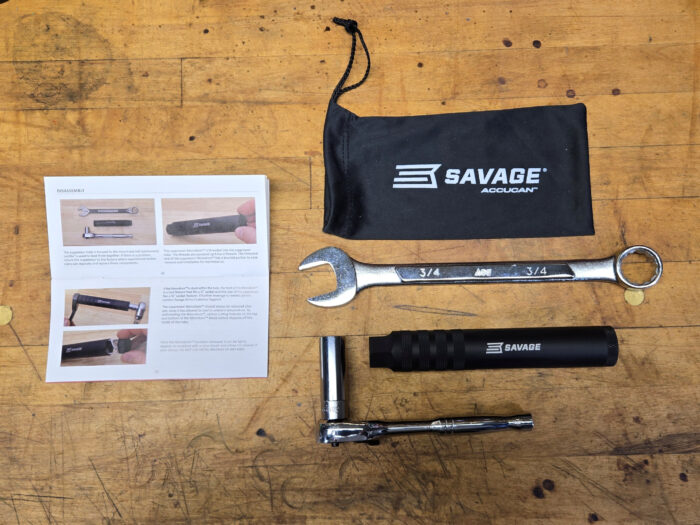
The A22 has a 1-inch diameter, is 5.9 inches long and weighs just 3.5 ounces. It uses a 1/2x28mm direct thread Titanium thread mount. Unlike my old suppressor, the new Savage is full-auto rated for .22 LR and semi-auto rated for .17 HMR and .22 Magnum. The A22 comes boxed with a decent manual and a drawstring pouch for storage and transport. It has a competitive MSRP of $449.
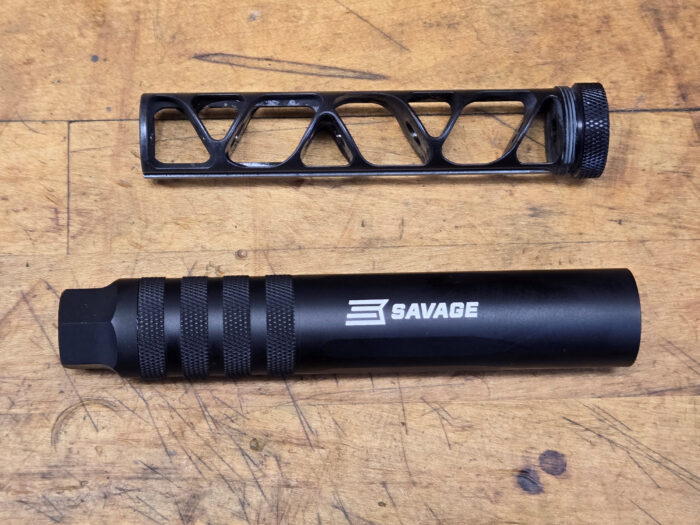
Wait times are way down for NFA items, and I had my suppressor within a week or so of ordering. That included time for the Form 4 to clear and for my current local SOT, CDS Arms (who is excellent, unlike my old one), to get the suppressor and for my Form 1 to clear. That’s a far cry from the year or so that I waited for my first suppressor to be approved by ATF.
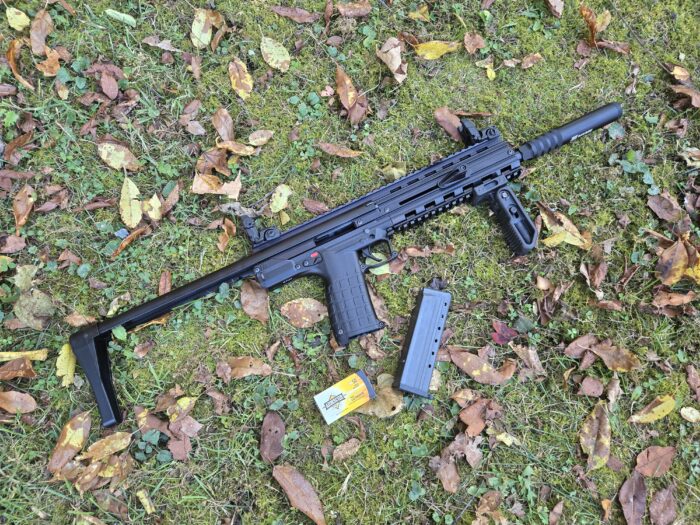
Initial Testing
It didn’t take long to try the A22 out. My SOT has an SBR’d Keltec CMR-30 in .22 Magnum, and we were both curious how the Savage can would do, so we popped it on his CMR and took it out back.
Now .22 Magnum isn’t subsonic, and a subsonic .22 Magnum would kind of defeat the purpose of the round. So we still got the supersonic crack of the round, but it did tame it considerably and bring it down to a hearing-safe level. After running a mag through the gun, we decided to see how it compared to another suppressor. My SOT pulled out a Rugged Oculus and we swapped out suppressors on the CMR. Using the same ammunition we found that the sound signatures on both cans were pretty much identical. At least to the ear, neither of us could notice a difference between the two. Being that the Oculus is a mainstay of rimfire cans, we thought that was a pretty good check on the Savage’s efficiency.
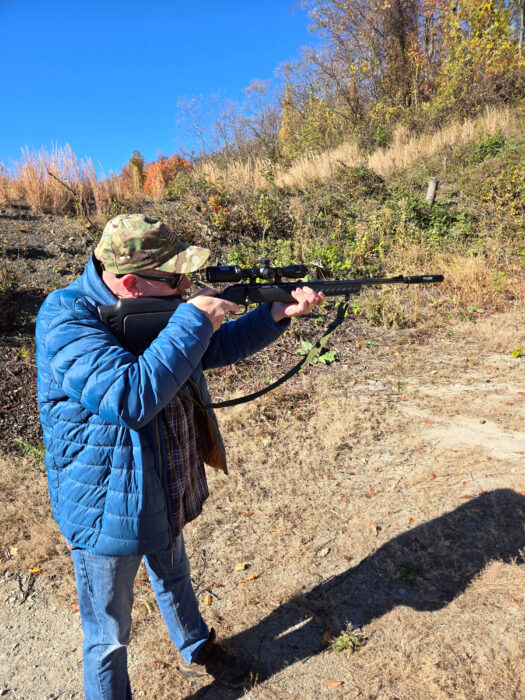
Further Field Work
I ordered a Savage B Series FV-SR rifle in .22 Magnum to use with this can, but was still waiting on the rifle to ship. In the meantime I wanted to see what else I could do with the A22. I arranged a range trip with a buddy, who has a CZ 512 Tactical with threaded barrel in .22 Magnum. I also took along my Ruger American Rimfire in .22 LR, and my Taurus TX22 in .22 LR. I brought my original rimfire suppressor, a Surefire Ryder along to compare on the .22 LRs.
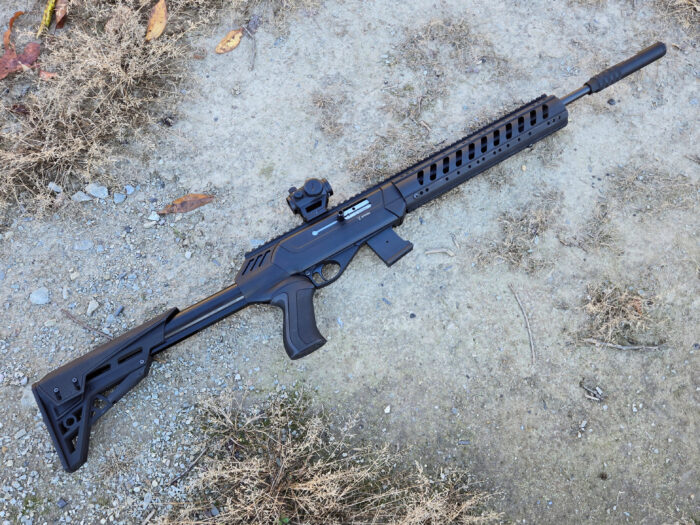
The CZ with the Savage can made for a pretty slick package. From past experience with that rifle we knew that it shot like a laser. It’s one of those guns that just hits whatever you point it at, and that didn’t change with the installation of the A22. We didn’t note any change in point of impact, at least not enough to notice in the shooting we did.
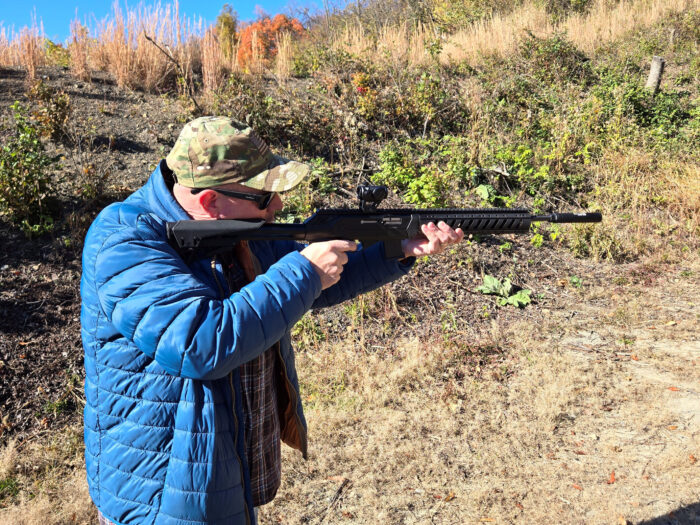
Sound signature was slightly lower than the KelTec CMR, but the CZ also had 6 inches more barrel. You still got the crack of the magnum round, but again, it was hearing safe and pleasant to shoot.
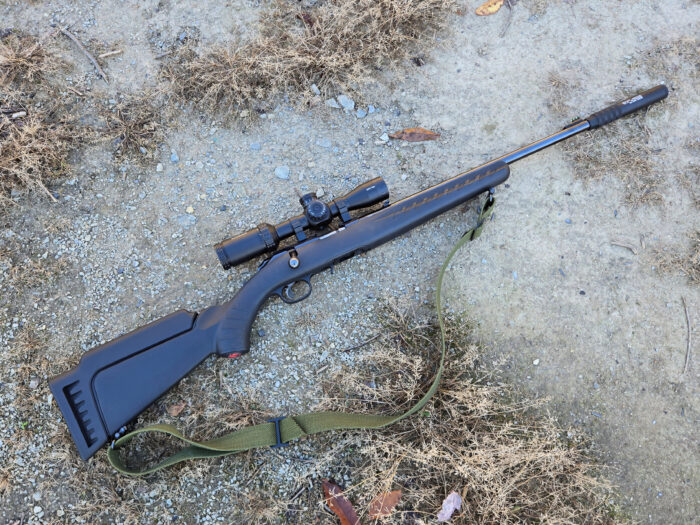
From there I swapped out the A22 to my .22 LR Ruger American. I ran a mix of CCI MiniMags, CCI Subsonic CLEAN .22 and CCI Quiet rounds through it. The MiniMags were notably quieter than the .22 Magnums, although it’s still a supersonic round with some crack to it.
The subsonic rounds through the A22 were legit movie quiet. It was extremely pleasant to shoot without hearing protection. You could decimate a local squirrel population with that combo, and they wouldn’t even know what was hitting them.
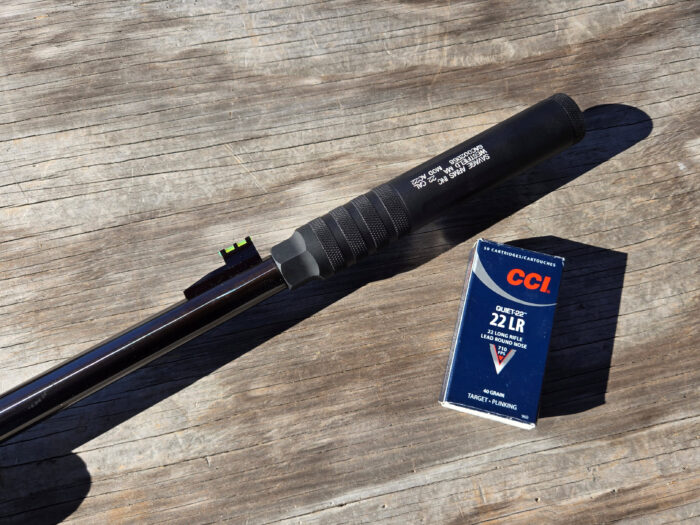
The CCI Quiet .22s were ridiculous. These rounds are, well, quiet, even out of an unsuppressed .22. They sound about like an airgun in the Ruger without a suppressor. With the Accucan A22 installed I could literally hear the click of the firing pin hitting the round and the round hitting the backstop. They don’t pack as much punch as even the subsonic .22s, but they work on rodents. I don’t think you could get any quieter than the Quiet round through a bolt-action rifle with a suppressor. While the point of impact varied slightly between the rounds, again I didn’t notice a real difference between the rifle with or without the suppressor installed.
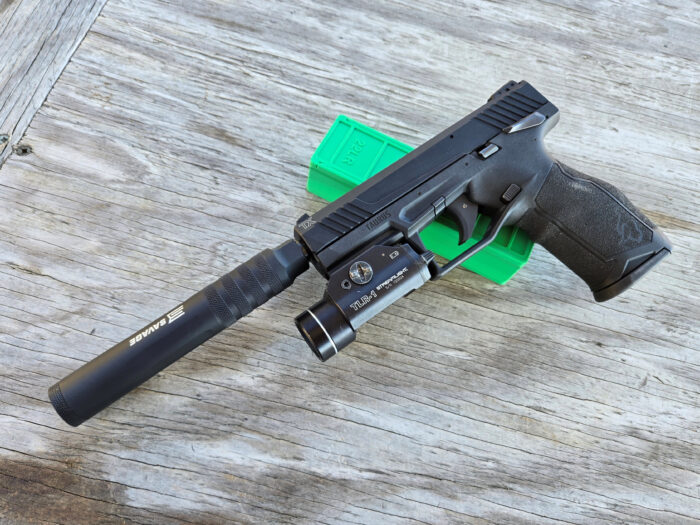
I then moved on to the TX22. I have to say the TX22 is my favorite pistol suppressor platform. The ergonomics of the gun are great, and it eats anything I stuff in it. It cycles reliably with subsonic rounds, something my Ruger MK IV does not. It has a healthy 16-round magazine capacity too, which makes plinking fun.
I ran a mix of MiniMags, the Subsonic rounds, and a variety of ammo from my mixed box of junk .22 through the gun. Function was flawless and sound suppression was as good as my Surefire, possibly a touch better although it was hard to say for sure by ear. I did not run the Quiet .22s through the TX 22 because I already knew that was the one round that it didn’t cycle. You can cycle the slide manually with them though if you really want an ultra quiet pistol load, but the subsonics worked well enough, so I didn’t bother.
I did tear down my A22 after my couple of range trips. It was simple to do following along with the manual. The monocore design makes it come apart easily. It’s a very simple design without many parts to worry about. The can really wasn’t that dirty from my range trips, but I did knock off some crud with a nylon brush, wipe it down and reassemble it.
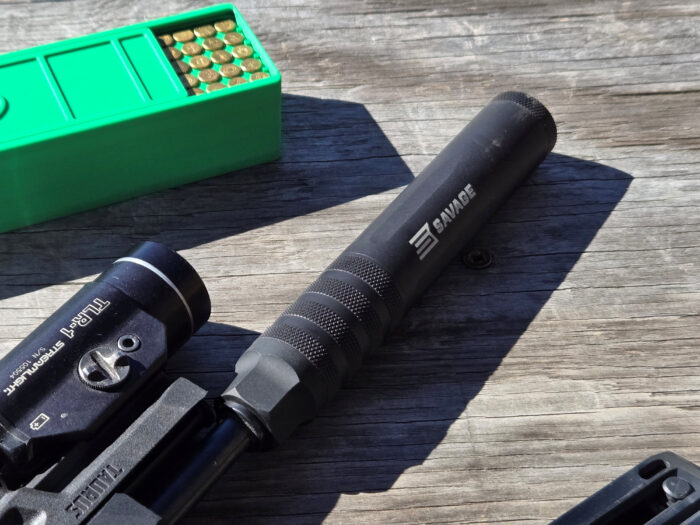
AccuCan A22 Pros and Cons
Performance on the AccuCan A22 was good, and it seems like a well-constructed suppressor. Take down is easy, and it’s user serviceable with common tools. Being aluminum, it’s lightweight too at only 3.5 ounces. The $449 MSRP is competitive with other rimfire suppressors and performance was at least equal to the other ones I had on hand for comparison.
As far as downsides go, my SOT noted that you can’t run aluminum suppressors through an ultrasound cleaner if they get really gunked up. Worth noting, although I don’t have an ultrasound cleaner anyway, so for me that isn’t a big issue.
The other thing he pointed out was that titanium suppressors generally can take higher pressures than aluminum ones. For example, some other .22 Mag-rated rimfire cans can also accommodate 5.7x28mm as well. The Savage is not listed as being rated for that although, in fairness, this and the rest of the Savage line seem more geared toward hunting and plinking use than any sort of tactical application. With that said, Savage’s centerfire AccuCan models are in fact rated for some pretty high pressure rifle rounds. The AC338 is rated for the .338 Lapua Magnum, the AC350 for the .350 Legend and the AC30 which will run anything up to 300PRC, including .300 Win. Mag.
While Savage might not be the first name to come to mind when you think about suppressors, the AccuCan A22 seems like a solid option. It functioned well on a variety of platforms and compared favorably to other good quality suppressors. Best of all from my standpoint is that this one is rated for .22 Magnum. I plan on dedicating it to the Savage FV-SR when it comes, to have an all-Savage platform, but it’s nice to know that it worked just fine on everything else, too. If you’re in the market for a new rimfire can, the A22 is worth taking a look at.
Check out Ammo To Go, the ammunition retail sponsor of TTAG. Get your bulk and quality ammo for a bargain by visiting their site.
Product and gun reviews are performed independently and product mentions made based on the quality of the product and value of interest to gun owners. However, when you buy through links on our site, we may earn a commission to help support the costs of operating the site and keeping it free for our visitors.
Read the full article here








